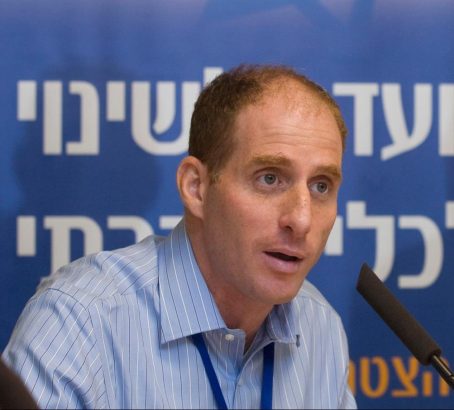Ron Gerlitz, the Co-Executive Director of Sikkuy, The Association for Civic Equality in Israel, argues that only a political alliance between the Jewish left, the Jewish centre, and Arab citizens has a chance of preventing the Israeli right from continuing in power and that such an alliance is feasible. And he issues a call to action: ‘Political activists, thinkers and doers, those in civil society, academia and from the political world, must begin work on creating a public atmosphere supportive of this option.’ A version of this article appeared in Fathom in Spring 2019 and has been extensively updated for the September poll.
Three large segments of the Israeli public – the Jewish Left, Jewish Centre and the country’s Arab citizens – face tremendous political challenges in modern day Israel. Substantial differences in ideology and identity separate them, yet the same ultra-right-wing government is battering them all, and all three are seeking an end to that. The best way to oust the present right-wing government is to create a political alliance among the three, and such an alliance, even if not close to being forged at present, is entirely possible. As things stand now, there is no other way. The right-wing is consolidating its rule by all possible means, and the prospect of leftist and centrist parties collectively obtaining 61 seats is negligible. If the 11 to 13 seats projected for the Joint (Arab) List are not counted toward the base of support for the next government, there will be no reasonable chance to form a non-right-wing government.
Prime Minister Benjamin Netanyahu understands this very well and that’s why, in his April and September 2019 election campaigns, he has gone on the offensive against Benny Gantz and Yair Lapid, who head the centrist Blue and White party. Netanyahu accuses them of harbouring extremely dangerous plans, including the intent to form a government reliant on the support of Arab citizens. ‘It’s Bibi or Tibi’ he repeats at every opportunity. This theme continues a well-worn and constant effort by the right-wing to delegitimise Arab participation in the governing coalition. In light of this, the failure to create a working partnership of the Jewish Left, the Jewish Centre, and Arab representatives will only further the chief project of Israel’s right-wing.
There are two common misconceptions about such a partnership. Among the Jewish mainstream, the misconception that the Arab political leadership is not a valid partner in this respect is attributable primarily to decades of increasingly intense right-wing incitement against both Arab leaders and Arab voters. Meanwhile, the Arab public believes it has no partner in the Jewish Left and Centre, a conviction reinforced in August 2019 by the unenthusiastic reaction of the newest centrist party, Blue and White, to the dramatic offer by the head of the Joint List, MK Ayman Odeh, to join a coalition headed by Gantz and Lapid if certain conditions are met.
In this essay, I argue that this response was ill-judged. A reasonable political partnership making possible a non-right wing government is politically feasible. Under certain conditions, I show, it would enjoy broad support from the Arab public and most of the Arab political leadership. Certainly, the Jewish Left and Centre should seriously consider supporting such a move in order to return to power.
BLUEPRINT FOR PARTNERSHIP: THE RABIN PRECEDENT OF A CIVIL MAJORITY
The second Rabin administration (1992-1995) was the first and so far the only government to rely on the Arab members of the Knesset. In the 1992 elections, Labor won 44 seats, Meretz 12, Hadash 3, and the Arab Democratic Party 2. Shas, which won 6 seats, initially joined the government before leaving in 1993 when the Oslo Accords were signed in September 1993. Rabin’s government subsequently became a minority government (with 56 seats) and was supported from the outside by the parties representing the Arab public; Hadash and the Arab Democratic Party. These two Arab parties, it should be noted, voted with the government from the outset in July 1992, with such support becoming critical in enabling the Rabin government to remain in power once it became a minority government.
The Rabin government shattered the undemocratic notion that the government’s base of support must be a Jewish majority, by relying instead on a civil majority. The agreement between Rabin and the representatives of the Arab voting public was that so long as the government strove for peace with the Palestinians and advanced equality for Arab citizens of Israel, Hadash and the Arab Democratic Party would prevent the Right from ousting the government. Both sides kept their end of the bargain. The Arabs supported the government through every no-confidence motion that threatened to topple it, and for two years had unprecedented influence on government policy.
While the Arab parties were not formally part of the coalition, their support enabled the government not merely to survive but to also carry out the most dramatic moves since the establishment of the state – recognition of the Palestine Liberation Organisation (PLO) in exchange for the recognition of Israel’s right to exist in peace and security, the signing of the Oslo Accords, and Israel’s military withdrawal from Gaza and Jericho. The government also took preliminary but important steps to redress longstanding discrimination toward Arab citizens – ending the embarrassing difference in child support allowances, securing recognition for several unrecognised Arab communities, and adding momentum to budget allocations for Arab local authorities. The change in policy and rhetoric was palpable, and there are many in Arab society who both recognise that time as the golden era of their relations with the state and support the re-establishment of such a government. Indeed, an early March 2019 op-ed in the New York Times by MK Ayman Odeh argued just this.
The partnership enabled the Left to return to power 15 years after the electoral upset of 1977 and to promote unprecedented steps toward reconciliation with the Palestinians, as well as enabling the Arab political leadership to initiate new progress toward reducing socio-economic gaps and change policies in a way consistent with the national aspirations of the Palestinian people. This fragile political understanding between the Zionist Left and the Arabs endured many hardships. But the agreement was honoured by both sides until a lone right-wing extremist ended it by assassinating the prime minister.
While the Oslo process did not ultimately lead to peace, we cannot know what might have been without Rabin’s murder and the subsequent election of Netanyahu, who set his sights on destroying the Oslo Accords. In any case, the shared political objective of the Jewish Left and Centre, as well as today’s Arab leadership, should be for the government of Israel to once again try again to reach peace with the Palestinians – something a right-wing government will not do.
TOWARDS A NEW BLOCKING MAJORITY
I will describe a blueprint for a less-than-close partnership in which the Arab MKs are not members of a Centre-Left coalition but instead support it externally, as a so-called ‘blocking majority’, as was the case during the second Rabin government. I will also describe what could make this possible in the current or future elections and what actions need to be taken in order to build such a partnership and replace the current government.
In recent years, supporters of the Jewish Centre and Left in Israel have witnessed a drastic deterioration of the values they hold dear. The government and the man who leads it have done damage to the rule of law and to the independence of the nation’s highest court, while augmenting the settlements and reinforcing the occupation. The prime minister and members of his cabinet, regularly incite against the Left and against Arabs. Many people believe that the current administration, corrupt and frightened, is leading the country over the edge and into the abyss.
Meanwhile, Arab citizens are subject to unprecedented and incessant political assault. Notwithstanding the economic interests behind recent government movement toward more equitable budgeting policies for Arab towns, on nearly all other fronts, the government continues to systematically, frontally and uninhibitedly undermine the rights of Arab citizens. The wave of legislation eroding their civil rights and legal status was epitomised by the now-notorious Nation-State Law in July 2018, and has been compounded by slanderous ministerial mudslinging that depicts Arab leaders as traitors who collaborate with the enemy, and repeated attempts to undermine Arab political representation.
The majority of Arab citizens, along with the Jewish Centre and Left understand that the only way to alter this reality is to displace the rightist government. However, none of these three groups can achieve that alone. It can only be done by a government led by the Centre or the Left and supported in one way or another by the MKs who represent the Arab public. Such a government would represent the majority of the citizenry, who despite their significant disagreements and disparities, can still agree on the practical broad directions that the government of Israel must take. This majority can, and must, be translated into a functional partnership that will replace the current government.
In a normal democratic system, the parties that represent most Arab citizens would be an integral part of a future governing coalition, but the prospects for that in the current climate seem dim. The external support from Arab MKs for a Centre-Left government, functioning as part of its base of support without being part of the government (in exchange for fulfillment of a list of demands), is an achievable goal and should be the key objective for anyone interested in a change of government in this next or any future election.
WHY CONVENTIONAL WISDOM IS WRONG
Conventional wisdom says that this is political fantasy and unachievable. In fact, that ‘wisdom’ is the product of three factors: a systematic proactive approach by the Right, targeting just such a potential partnership; irresponsible declarations by politicians on all sides of that potential partnership; and barriers that may seem intractable but are not.
To begin with, the Jewish Centre and Left and the Arab mainstream straddle the two sides of the Zionist-Palestinian conflict. In this potential political partnership, each would accord political legitimacy to the other. Given our reality in which most Arab citizens see Zionism as a racist movement, the Jewish Centre and Left will find it hard to politically connect with them. Arab citizens likewise find it difficult to connect with a government that adheres to the Zionist ideology that brought them the Nakba and the loss of their homeland. The clear recognition that the alternative to this partnership must be disastrous for both sides, however, is what can make such an arrangement possible.
ODEH’S OFFER AND THE POSITION OF THE ARAB PARTIES
Secondly, and this is a central impediment, the Jewish public, and the influential figures who shape Jewish opinion on the Left and in the Centre, believe that Arab political leaders are not prepared to accept such a development. This inaccurate view is based on inadequate familiarity with the Arab political leadership in Israel. The vast majority of that leadership understands that the only route to curbing the government’s political attacks against Arab citizens, and perhaps also moving us closer to an end to the occupation, is via the replacement of this rightist government with a government of the Centre-Left. If they have an opportunity to choose, in exchange (of course) for clear demands, Arab political leaders will support such a government from the outside in order to block another right-wing government.
It is worth examining the position taken on this issue by each of the four parties that represent Arab citizens and are running in September 2019 together in a Joint List. Members of Knesset from Hadash (an Arab-Jewish party, the full name of which is The Democratic Front for Peace and Equality) speak out consistently on the matter, declaring publicly that they will not be the ones to prevent putting an end to the rightist government. Their message is very clear: If the election results make it possible, they will join a blocking majority to enable and support a non-right-wing government.
On 22 August 2019, the head of the Hadash and of the Joint List, MK Ayman Odeh, made a dramatic and historic statement. He declared that he is ready to join a coalition lead by the Center and the Left if certain demands are met. The demands that he mentioned as a condition to join the government are:
- Negotiations with the Palestinians towards ending the occupation and establishment of independent Palestinian state.
- Real steps to advance equality for Arab citizens including repealing the Nation-State Law, increasing the budgets and extending the jurisdiction borders of the Arab cities, stopping of house demolitions of Arab citizens, construction of a new hospital and university in an Arab city and committing to stop violence and crime in Arab communities.
Odeh’s statement met a lot of criticism, including inside Hadash. Nevertheless, some Hadash MKs supported Odeh statement and said that although they did not expect Blue and White to respond positively, these were the correct demands for joining the coalition. Similarly, while the majority of the Arab leadership objected to the idea of joining the coalition, they emphasised that supporting a non-right wing government from the outside (if certain demands were met) is a correct goal for the Joint List. This is good news for anyone that supports such political partnership.
MK Yousef Jabareen of Hadash, for example, explained that their constituency would support such a move under certain circumstances. Of significance to this discussion is the fact that participation by Hadash in a blocking majority during the second Rabin government was led at the time by Tawfiq Zayyad, a distinguished and respected national figure among Arab citizens. This precedent will make it easier for Arab politicians to tread the same ground again, given suitable circumstances. Jabareen’s view is that the realities of an extreme right-wing government under Netanyahu oblige the Arab public to pursue another blocking majority, and the conditions he believes must be the basis for negotiations about joining a blocking majority are very similar to the ones MK Ayman Odeh set out in his August 2019 declaration.
MK Ahmad Tibi, who heads the Taal party, was interviewed at length by the Calcalist in February 2019, and declared himself ready to join a blocking majority to prevent another government headed by Netanyahu. The key conditions he sets are: extensive budgetary allocations for Arab towns, including for housing; an effective struggle against violence in Arab communities; recognition of the unrecognised Bedouin villages in the Negev; annulment of the Nation-State Law; and the appointment of an MK from one of the Arab parties to the chairmanship of the Knesset Finance Committee. Following MK Odeh’s declaration in August 2019, MK Tibi said that while he is against joining the coalition he too would support a non-right wing government from outside, just as support was lent by Arab parties to the Rabin government.
MK Mansour Abbas, head of Raam (the Islamic Movement’s southern branch) said on 7 April, two days before the previous elections, that a government that would lead a process towards ending the occupation, cancel the Nation-State Law and meet other demands related to equality to the Arab citizens (which happen to be almost identical to those MK Odeh mentioned in his August 2019 statement), would enjoy their support from the outside.
The Balad party takes the opposite position, but they speak for only a minority among the Arab public. A survey in November 2018 suggested that 64 per cent of the Arab public supported the idea of the Arab parties joining the government, while fully 80 per cent thought that the Arab parties should support the government from the outside in exchange for fairer budgets. On 27 August 2019, the Jerusalem Post reported that a survey conducted by the Statnet Research Institute found that 78 per cent of the Israeli Arab community support the Joint List entering a coalition after the September election and 76 per cent supported Odeh’s declaration that he would join a Centre-Left government (under certain conditions).
The bottom line is that at least three of the four parties representing Arab citizens are expected to support joining such a blocking majority under certain conditions. Should the votes of Arab members of Knesset be required to form a government of the Centre and Left to unseat the Right, most of those votes, with the possible exception of Bald, would be forthcoming.
THE POSITION OF THE JEWISH LEFT AND CENTRE
Within the Jewish Left and Centre, there is disagreement. The leaders of Meretz and Labor positively welcomed Odeh’s offer but the new centre party, Blue and White, did not. Their delusion that the party will be able to form a government with 61 Knesset seats without the Arabs persists. This posture is hard to fathom, considering the balance of power in the current Knesset, in which the leftist and centrist parties have a total of 45 seats (35 for Blue and White, 6 to Labor and 4 to Meretz), and given that although the current leadership of Blue and White presented itself as relatively hawkish in April (there are three generals in its leadership and one of them is right-wing,) they still failed to secure votes from the Right and win the election.
It is worth bearing in mind some history. In the last 40 years the Left has held power only twice, and both times Arab citizens played a significant role in the victory. As discussed above, it was their representatives who supported the second Rabin government and, in 1999, when there was a direct election for Prime Minister as well as for the Knesset, it was Arab voters who provided the numbers that put Ehud Barak ahead of Netanyahu. Hence many from the Left and some of the leadership of the Centre understand very well that the present government cannot be replaced unless Arab citizens are part of the new government’s base of support.
Moreover, a study commissioned in August 2019 by The Abraham Initiatives and Chord center showed that despite the incitement from the Right, the Israeli public who support Center-Left parties, will not be put off if those parties approach Arab voters and their elected officials. There have been signs that the Blue and White campaign is beginning to understand this and act accordingly. On 26 August, only a few days after MK Odeh statement, Benny Gantz said that he would appoint an Arab minister (‘from or not from the Joint List’).
‘RABIN WANTED TO REMAIN PRIME MINISTER; HE HAD NO OPTION EXCEPT ARAB SUPPORT’
People also need to bear in mind the political reality. A few years ago, in an interview I conducted with former Labor MK Moshe Shahal, we discussed a series of meetings he had attended in the 1990s with Hadash chairman Tawfiq Zayyad, during which they forged the understandings which in July 1992 became the basis of Hadash’s support for the Rabin government. When I asked him how super-security-oriented Rabin had agreed to a minority government reliant on the Arabs, he replied: ‘Rabin wanted to remain Prime Minister, and he had no other option except Arab support.’
Thus far, however, playing the hand dealt by Prime Minister Netanyahu with his accusations about their intention to rely on Arab MKs as their base of support for forming a government, the Blue and White party has refrained from any reference whatever to a possible obstructive bloc with the Arabs. However, if the only way that Gantz or another future leader in the Centre-Left bloc can be prime minister is to add the Arabs to his government’s base of support – whether because Likud declines to join their government, because they are politically pressured not to form a national unity government with Likud, or they decide to do something substantive vis-à-vis the Palestinians – the chances are that he will follow Rabin’s path and invite the Arabs to join a blocking majority in support of the government.
The recreation of the partnership between the Zionist Left and the Arabs during the second Rabin administration, over 20 years ago, must now become the minimum objective for a political partnership allowing the formation of a new Centre-Left government and perhaps laying the foundations to enable the Arab leadership to join the coalition. Bear in mind that such a partnership, which need not be conditioned on first bridging the deep ideological gaps between the Zionist Left and Centre and the Arab leadership, can still determine the objectives which the government should be pursuing and what it must refrain from doing. That sort of functional agreement is certainly possible.
CALL TO ACTION
In order to push ahead with this, the relevant stakeholders should not wait for the elections or the day after. The notion that removing the current government is impossible has generated a sense of despair among all three of the potential partners and could well lower the turnout on election day, especially among Arabs. Lower turnout could mean the loss of some seats for the Jewish-Centre-Left-Arab bloc, a failure to prevent a new rightist government, and a missed opportunity for the kind of positive process that could have followed the election. To seize the opportunity for real change, concrete steps must be taken immediately to encourage the idea on both sides that an alternate scenario is both possible and desirable.
Here, then, is a call to action: Political activists, thinkers and doers, those in civil society, academia and from the political world, must begin work on creating a public atmosphere supportive of this option. They should demand that the leadership on both sides promote it, and should begin writing about it without delay, describing how this political partnership would look: What are the conditions for supporting a government from the outside? Different versions of a potential agreement should be drafted to address different scenarios, including an agreement to outline the dimensions of support from the outside for a centre-left government as well as the conditions for joining the coalition (even though the latter is a very low-probability scenario).
The field of relations between Jewish and Arab citizens is full of ideas, including in writing, about the existing situation and potential final agreements addressing the relationships and the regional situation. The existing documents, however, do not address the crucial matter of political partnerships that could enable the establishment of a government in Israel that would eventually secure an end to the occupation and stabilise these relationships in a positive way.
Thus far, various figures among the Arab leadership have proposed different requirements: the revocation of recently passed discriminatory legislation like the Nation-State Law; real steps to advance equality for Arab citizens, including an end to home demolitions in the Negev; expansion of the jurisdictional areas of Arab towns; significant steps to reduce discriminatory budgeting; and the appointment of Arabs to head Knesset committees. This is about taking steps that are real and substantial from both a practical and a symbolic standpoint, and they are partially implementable immediately. Moreover, the Arab leadership will naturally also demand that serious negotiations be started with the Palestinians, en route to ending the occupation.
Demands such as these, although challenging for the Jewish Left and Centre, do not contradict the Centre-Left worldview, so it is reasonable to anticipate a positive response that will assure the support of most of the Arab Knesset members for the new government. And as long as the conditions are met, most of the Arab public will also support this – exactly as they did for the Rabin government.
The political leadership of the Jewish Centre-Left and of the Arabs must do their part to promote the atmosphere required to breathe life into this partnership after the elections. They will need to speak out strongly to counter voices in both the Jewish and Arab public that try to portray supporters of this idea as politically weak and insufficiently nationalistic.
But even now, especially now, while Prime Minister Netanyahu is leading a no-holds-barred campaign trumpeting the ‘danger’ of such a partnership, the level-headed and responsible leadership on both sides can and should pave the way for a successful working partnership. The leadership of the centrist parties, and of Labor and Meretz and the Arab parties, must move to establish a mechanism to press ahead with thinking and discussion about this, and the party memberships must start pressuring their leaders to act. It is important to create quiet agreements about non-participation in the delegitimisation of the other side, and about refraining from attacking the other side in a way that delegitimises a future partnership. As a trust-building measure, the leadership of the Centre and Left must avoid supporting any step designed to disqualify any Arab Knesset member or faction and must actively and consistently oppose the attack that the present government is leading against Arab citizens.
THERE IS NO ALTERNATIVE
Given all of the foregoing, a functional political alliance along the lines proposed here will necessarily be a complicated and difficult process on both sides: For the Arabs, it won’t be easy to go from being constantly in the opposition to supporting the government, and there are forces in Arab society that will attack such an alliance. On the other side, having become much stronger in recent years, the Right will unleash a firestorm against a government that allies with the Arabs, since the delegitimisation of Arabs by the regime in power is one of the big political achievements of the right. The streets will be full of demonstrators and the Shin Bet will need to protect the prime minister very well this time.
Perhaps the prospects for such an alliance to come about are not bright. But for those who hesitate I would ask – what’s the alternative? In practical terms, what do you propose to do in order to prevent the continuation of right-wing rule, which is corrupting the country, severely damaging the foundations of democracy, leading to ever more violent confrontations with the Palestinians under occupation, destroying the relations between citizens, and liable finally to drown us in blood? There is only one way to prevent this nightmare: To establish a reasonable, rational political partnership between the Jewish Left and Centre and Arab citizens, one that will enable the government of Israel to try, again, to end the Israeli-Palestinian conflict and give all our children hope and a future in this land.
* This was translated from the Hebrew by Deb Reich and appeared in its original form in Hebrew and Arabic in September 2018 in ‘Achievable Alliances’ edited by Amir Fakhoury and published by the Research Center of the School for Peace at Neve Shalom~Wahat al-Salam. It was updated and published in Fathom in Spring 2019 and has been been further updated for Fathom for the September 2019 election campaign. These are the personal opinions of the author.




































